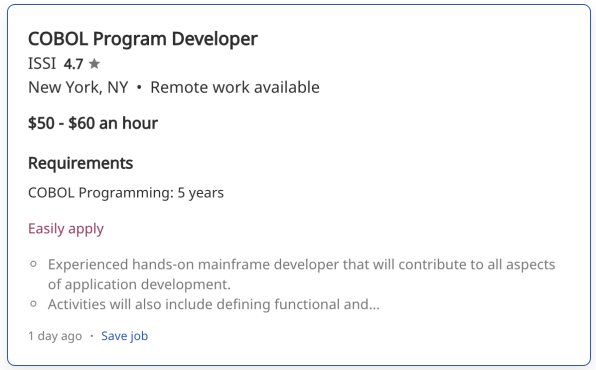COBOL, a 60-year-old computer language, is in the COVID-19 spotlight
Some states have found themselves in need of people who know a 60-year-old programming language called COBOL to retrofit the antiquated government systems now struggling to process the deluge of unemployment claims brought by the coronavirus crisis.
The states of Kansas, New Jersey, and Connecticut all experienced technical meltdowns after a stunning 6.6 million Americans filed for unemployment benefits last week.
They might not have an easy time finding the programmers they need. There just aren’t that many people around these days who know COBOL, or Common Business-Oriented Language. Most universities stopped teaching the language back in the 1980s. COBOL is considered a relic by younger coders.
“There’s really no good reason to learn COBOL today, and there was really no good reason to learn it 20 years ago,” says UCLA computer science professor Peter Reiher. “Most students today wouldn’t have ever even heard of COBOL.”
Meanwhile, because many banks, large companies, and government agencies still use the language in their legacy systems, there’s plenty of demand for COBOL programmers. A search for “COBOL Developer” returned 568 jobs on Indeed.com. COBOL developers make anywhere from $40 to more than $100 per hour.
Kansas governor Laura Kelley said the Kansas Department of Labor was in the process of migrating systems from COBOL to a newer language, but that the effort was postponed by the virus. New Jersey governor Phil Murphy wondered why such an old language was being used on vital state government systems, and classed it with the many weaknesses in government systems the virus has revealed.

The truth is, organizations often hesitate to change those old systems because they still work, and migrating to new systems is expensive. Massive upgrades also involve writing new code, which may contain bugs, Reiher says. In the worst-case scenario, bugs might cause the loss of customer financial data being moved from the old system to the new.
It still works (mostly)
COBOL, though ancient, is still considered stable and reliable—at least under normal conditions.
The current glitches with state unemployment problems are “probably not a specific flaw in the COBOL language or in the underlying implementation,” Reiher says. “The problem is more likely that some states are asking their computer systems to work with data on a far higher scale, he said, and making the systems do things they’ve never been asked to do.”
COBOL was developed in the early 1960s by computer scientists from universities, mainframe manufacturers, the defense and banking industries, and government. Based on ideas developed by programming pioneer Grace Hopper, it was driven by the need for a language that could run on a variety of different kinds of mainframes.
“It was developed to do specific kinds of things like inventory and payroll and accounts receivable,” Reiher told me. “It was widely used in 1960s by a lot of banks and government agencies when they first started automating their systems.”
Here in the 21st century, COBOL is still quietly doing those kinds of things. Millions of lines of COBOL code still run on mainframes used in banks and a number of government agencies, including the Department of Veterans Affairs, Department of Justice, and Social Security Administration. A 2017 Reuters report said 43% of banking systems still use COBOL.
But the move to newer languages such as Java, C, and Python is making its way through industries of all sorts, and will eventually be used in new systems used by banks and government. One key reason for the migration is that mobile platforms use newer languages, and they rely on tight integration with underlying systems to work the way users expect.
The coronavirus will be a catalyst for a lot of changes in the coming years, some good, some bad. The migration away from the programming languages of another era may be one of the good ones.
(11)



